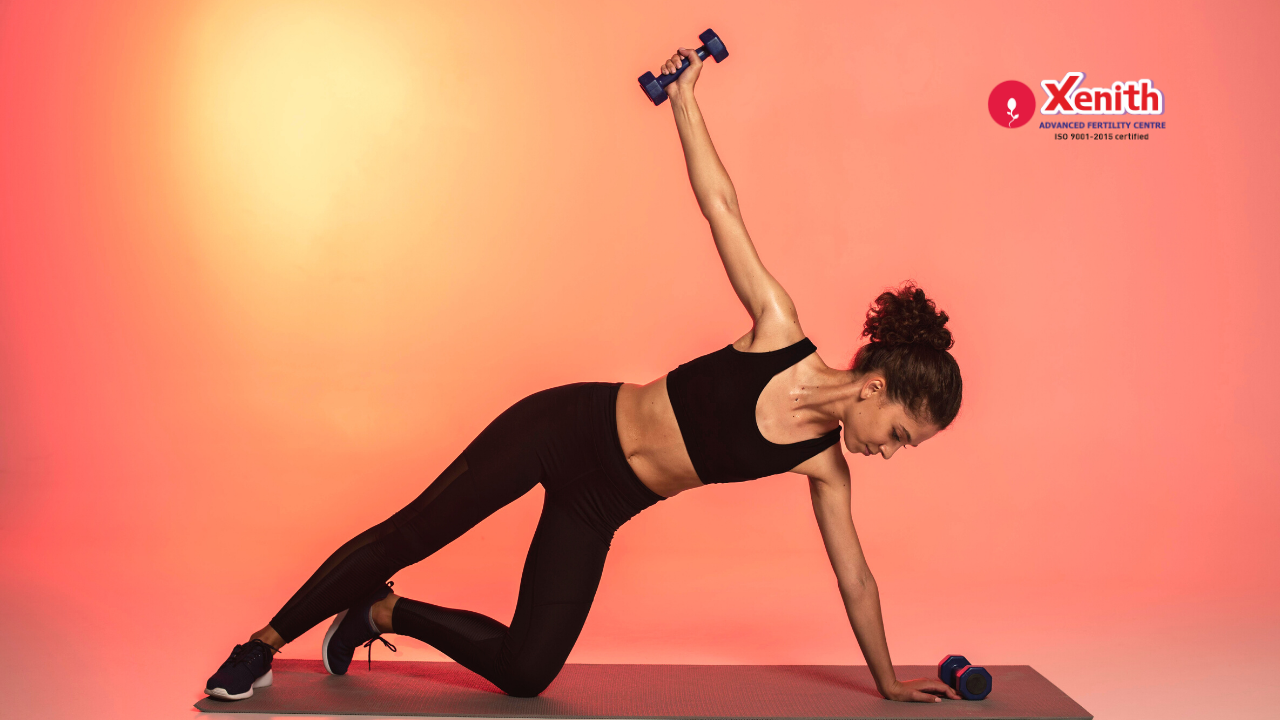Exercise can have a positive impact on our body including brain health, bone and muscle strength and weight management. Exercise can also help reduce risk of cardiovascular disease. But too much exercise without enough caloric intake can have a detrimental effect on your body in ways you may have not considered. An energy deficit occurs when you don’t have enough energy for your body to complete its basic functions. The reproductive system is very sensitive to energy deficit.
How do you interpret weight?
Body Mass Index (BMI) is tool used to measure the amount of excess fat the body and it is based on a person’s height and weight.
| BMI | Interpretation |
| <18.5 | Underweight |
| 18.5-24.9 | Healthy weight range |
| 25.0-29.9 | Overweight range |
| >30.0 | Obese |
A BMI of 18.5 or less (underweight) or a BMI in the obese range often causes irregular menstrual cycles and ovulation. However, ovulation isn’t the only issue. A doctor can help identify other disorders related to obesity that impact pregnancy such as thyroid disease, insulin resistance, and diabetes.1
Vigorous exercise and fertility in women with normal weight
Vigorous exercise may decrease fertility in women with normal weight. If there is an energy deficit, the body will try to conserve energy by suppressing the reproductive hormones. Estrogen and progesterone concentrations will decrease affecting menstruation. Progesterone levels, which are usually high because it allows the fertilized egg to attach itself to the uterine lining, may decrease interfering with its implantation.
The luteal phase, which is the period between ovulation and the next menstruation (about 2 weeks), is also affected due to this. It can also suppress growth of the follicles and maturation of the egg as well as lead to poor quality of the endometrium leading to infertility.
Another reason could be due to change in levels of the hormone leptin which regulates appetite and metabolism and you may not eat enough. Yet another reason could be the hormones responsible for regulating the female reproductive system like GnRH, LH, FSH and estradiol levels are changed to interfere with ovulation. All this could lead to disturbances in the menstrual cycle making it irregular or completely absent.
Vigorous exercise and fertility in women with overweight women
However, the effect of vigorous exercise on overweight/obese women or those suffering from polycystic ovary syndrome (PCOS) or anovulatory infertility, showed that exercise, with or without diet, can lead to resumption of ovulation. So vigorous exercise may improve fertility in women who are obese because it will help you lose weight but may decrease fertility in women who are at their normal weight. Studies suggest that losing body weight can boost your health and fertility if you are currently obese.2 However, it is important to understand the type and extent of exercise and doing it under supervision may be a good idea.
Vigorous exercise and fertility in men
There’s not much data when it comes to male infertility and exercise but constriction of testicles like wearing bike shorts reduces sperm count and impairs sperm motility. Also, any exercise that causes overheating of scrotal region could decrease fertility. Performance enhancing steroids reduce the amount of male reproductive hormone secreted in the brain and reduce testosterone concentration in the testes which affects sperm quality, quantity and motility and morphology. In men, being overweight can also affect the quality and quantity of their sperm.
How much and what type of exercise is beneficial or detrimental
Regular exercise can improve fertility and lower stress, especially in women who are overweight.
Moderate exercise
Moderate exercises can include brisk walking, swimming, bicycling, dancing, and yoga or other activities that need moderate effort and speed your heart rate and breathing but don’t make you out of breath. With moderate exercise, you feel like you are breathing more deeply than normal but are not breathless. Another measure is talk test. If you can talk throughout your workout without pausing for breath, you are likely doing a moderate intensity workout. Research shows that moderate exercise is beneficial to everyone and could improve fertility.3
Vigorous exercise
Vigorous activity means any exercise that makes you breathe hard and fast. If you’re working at this level, you won’t be able to say more than a few words, without pausing for breath. One study showed that women engaged in extreme exercise for over 60 minutes per day may be at higher risk of problems with ovulation. But women who exercised vigorously for 30 to 60 minutes may actually reduce anovulatory infertility.4
Tips for exercising when trying to conceive
When trying to conceive, try replacing some of your more intense workouts with gentler forms of exercise like yoga or walking leisurely. Weight training can be moderate depending on the amount of weight you lift, the number of repetitions or the type of exercise. Examples of intense exercise include CrossFit, powerlifting, marathon training, high intensity interval training, and racquetball. IVF success rates may also be reduced by exercising too much.
If you have been struggling to get pregnant and/or do not have regular periods it may help to bring down your level of activity to a moderate level as well as making sure you eat enough food to replace the energy used during exercise. Some of the ways you can avoid overtraining is by simply listening to your body, getting enough rest, consuming enough calories for your level of exercise, drinking enough water, get enough sleep each night, not exercising in extreme heat or cold, taking a break if you aren’t feeling well, resting at least 6 hours between periods of exercise and take a full day off every week.
Conclusion
The good news is that fertility issues due to overexercise could be reversed if you are vigilant about consuming enough calories to account for your levels of exercise. If you suspect that your weight might be connected to your inability to get pregnant, talk to a fertility consultant.
Enjoy the exercise you are doing so that you are more likely to continue it and discuss your individual issues and consult with an expert at Xenith Advanced Fertility Clinic, near you, about how much you should work out and how you can improve your chances to conceive. Schedule an appointment today!




